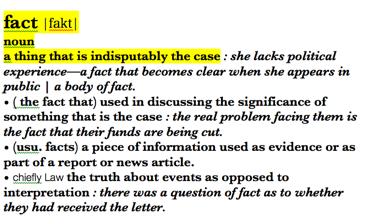
Sometimes it seems best to stick to the facts when you talk about your work.
You need to promote it, but you don’t want to seem sales-y, so you just state the facts on your flier, in your email, or on your Web site.
Someone asks about your work, and you keep the conversation as brief and unemotional as you possibly can, so you don’t seem to be tooting your own horn.
Or you sit down to write a Web page, and your mind goes utterly blank. Finally, you crib someone else’s page, changing the facts as needed, and get the bleeping thing done.
In all these circumstances, you’re doing what I call “just the facts” marketing.
But something about that kind of marketing doesn’t feel right. Because “just the facts” marketing is broken. (As you doubtless know, because it happens not to be working.)
And then you remember.
You care
By some grace, you remember. You care about your work. A lot. And you care about the people you work for.
You remember why you do what you do. Why you keep doing it even when it is difficult.
You remember your intentions for buyers and clients.
And care comes flooding back. (Actually, the care was there all the time. What comes flooding back is the awareness that you care.)
Care brings an irresistible desire to serve
The thing about care is that it instills a virtually irresistible desire to serve. And when you are impelled to serve, you will do whatever you can so the ones you care about get served.
Which means marketing to them. It means telling them about your work and supporting them in hiring you, because that’s in their best interest.
And suddenly, the light goes on.
“Just the facts” is no way to market to people you care about
Marketing is a conversation. And “just the facts” marketing is no way to have a conversation with people you care about. It’s broken because it’s boring and distant. It doesn’t convey care, let alone what you can do for people because you care.
It leaves out your commitment to their wellbeing. It soft pedals the significance of your offer. It minimizes the impact of your work. All of which means the very people who most need your work don’t get it.
And, quite against your real intentions, “just-the-facts” marketing implies you don’t care a whole lot.
So you need to put care and service in your marketing.
“But I already tell people I care”
At this point you may be saying, “But I do tell people I care. I do it all the time.”
I understand. But saying you care is not enough. You have to demonstrate it. You have to spell it out. You have to repeat it.
Because even when people know you care (think of your family), they need constant reassurance that you care. That you want to serve them.
Clients and prospective clients need that reassurance even more.
Care enough to say what’s at stake
When you think about the implications of caring, you realize why it’s so important to spell out the benefits of hiring you and the costs of inaction.
Not because you want to scare people. But because their well being or success is at stake.
If you are a body worker, you want people to have healthy bodies. So tell people what can happen if they don’t get regular body work. Let them know that taking care of their body now can prevent degeneration or loss of function in the future.
If you are a self-employment coach, you want people to create meaningful wealth doing work they care about. So tell people not just how you can help, but what can happen when they don’t get support.
Um…
This article started with a personal experience.
As Profit Alchemy 2011 neared completion, folks asked what would come next. After a number of conversations, I designed a mentoring program for them.
I wrote a “just the facts” Web page, laying out the nuts and bolts. That was enough for a few people. But quite a few more were left wondering just what my intentions were. How much support was I going to give? Would this be more of the same, which had been great, but is that really what they wanted or needed? How would this be different from applying what they had learned on their own?
Even these people I had worked closely with could not tell from the Web page how much I cared or how I intended to serve them. They didn’t know (because I hadn’t said) that everyone I know who is successfully self-employed has a coach, is being mentored, or is in a course (or some combination of the above).
They couldn’t know the stakes.
Listen to your people
Fortunately, a few people asked me enough questions about the mentoring program that I realized what was missing. (Like the fact that it is a mentoring program.)
Suddenly I was flooded with care and concern. I was aghast that I had left my care and concern out of the Web page. That I had taken it for granted that people would know how I felt and why I felt it was so important that they join the program.
So I rewrote the Web page with passion. It was easy, because I knew writing it was an act of service. And, no surprise, most of the people from Profit Alchemy signed up.
Results measure the scope of service
Results are nice. They are nice for your ego. They are nice for your pocket book.
They are especially nice because they mean you get to do work you love. And they are beyond nice because they mean that work is serving people you care about.
That’s a fact.

